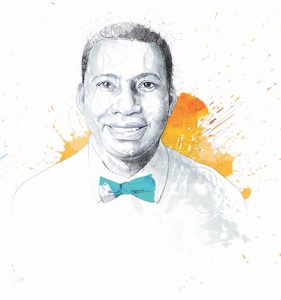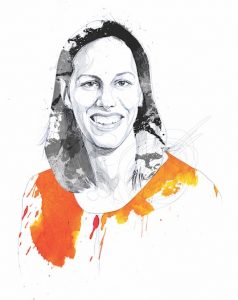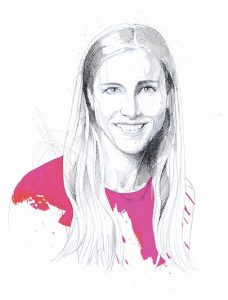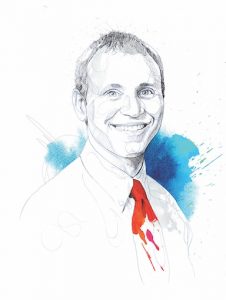The Immunotherapy Generation
November 22, 2017 | Matt Batcheledor

David Chism, 42
Assistant Professor of Medicine
Education: B.A., Georgetown University, M.Sc., Tulane University, M.D., University of Tennessee
Research area/medical specialty: Clinical research in genitourinary oncology with a focus in bladder and kidney cancer, medical oncology.
When did you join VICC and why did you choose to work here?
January 2016. I chose to work here because of the two L-words—leadership and location. VICC has an excellent national reputation for high- quality cancer and urology care, and I was particularly attracted to the leadership styles of both the department (Medicine) and division (Hematology/Oncology). Nashville is one of the top 10 cities to live in with a diverse blend of cultures, ethnicities and backgrounds.
What excites you about immunotherapy and the expanding array of cancer treatments?
Before 2016, there was no FDA-approved second-line treatment for metastatic bladder cancer. Patients who progressed despite platinum-based therapy and who were ineligible for clinical trial participation received salvage chemotherapies with single agents like docetaxel or pemetrexed with response rates less than 20 percent. Within a one-year span, five novel immune checkpoint inhibitors—two PD-1 inhibitors (pembrolizumab and nivolumab) and 3 PD-L1 inhibitors (atezolizumab, durvalumab and avelumab)—have gained accelerated approval for bladder cancer in the second-line setting.
Why did you become a cancer doctor?
One of my earliest impressions with cancer was witnessing the passing of my Uncle Robert from kidney cancer. He was a gregarious fellow, a mechanic who slowly withered away. I remember most his cracked-toothed grin. He fathered eight children with the youngest age 8 at the time of his passing in the 1990s. Now, my life’s challenge has been to hit cancer head-on and, if fortunate, to unleash new memories of hope gleaned from top-notch Vanderbilt research. As the first doctor in my family, I am also thrilled to be a part of the VICC family.

Kristen Ciombor, 38
Assistant Professor of Medicine
Education: A.B., Biochemical Sciences, Harvard University, M.D., University of Miami, MSCI, Vanderbilt University
Research area/medical specialty: Gastrointestinal medical oncologist
What date did you join VICC and why did you choose to work here?
July 2017. There are wonderful research opportunities in gastrointestinal oncology at Vanderbilt, and I am looking forward to building and reinvigorating my collaborations with other disciplines to maximize the translational capabilities in the GI oncology space.
What excites you about immunotherapy and the expanding array of cancer treatments?
In the last few years, there have been several advances with immunotherapy use in GI malignancies, and it’s a very exciting time. I was fortunate to be a part of the breakthrough trial that identified mismatch repair deficiency as an excellent predictive biomarker for pembrolizumab efficacy, which led to its recent FDA approval for this indication and its publication in Science. Additionally, I was part of the study team that found nivolumab to have intriguing efficacy in some patients with advanced anal cancer, a GI malignancy with particularly few therapeutic options. In both cases, it has been so gratifying to partner with patients willing to enroll in clinical trials and then see these treatments work, often beyond what anyone expected.
Why did you become a cancer doctor?
The field of medical oncology is the perfect marriage of scientific discovery and patient care. I love taking care of patients during what is often an incredibly frightening time for them and their families, and in many cases, we are able to have a long and rewarding relationship. Being a part of the scientific enterprise at a world-renowned institution such as Vanderbilt and helping the field of oncology to advance therapeutically is an honor and a challenge.

Elizabeth Davis, 34
Assistant Professor of Medicine
Education: B.S., Duke University, M.D., Wright State University
Research area/medical specialty: Hematology-oncology, focus on sarcoma/melanoma, early phase clinical trials
When did you join VICC and why did you choose to work here?
August 2016. I chose to work at Vanderbilt because of the breadth of clinical and research opportunities afforded to me at this institution. The Vanderbilt-Ingram Cancer Center is a leading institution for providing and advancing oncologic care. The environment fosters collaboration between basic, translational and clinical researchers.
What excites you about immunotherapy and the expanding array of cancer treatments?
Immunotherapy has revolutionized the treatment of several malignancies including melanoma. This is particularly exciting as we are in the infancy of our knowledge about these therapies. Going forward, we will continue to investigate how to best incorporate immunotherapy combinations or immunotherapy in combination with other types of cancer treatments such as radiation. Having these new tools is exciting as it allows physicians to offer patients more hope in diseases where the prognosis has historically been very poor.
Why did you become a cancer doctor?
I chose to become a physician because of my interest in cancer biology, genetics and immunology and my desire to help other people. During medical school, I discovered that a career as a medical oncologist would allow me to forge my scientific interests with my patient care interests. I enjoy my job as an academic medical oncologist because it allows me the opportunity to focus on specific cancer types while also conducting research that could result in new treatment options for patients.

Michael Byrne, 37
Assistant Professor of Medicine
Education: B.A., B.S., Duquesne University, D.O., Lake Erie College of Osteopathic Medicine
Research area/medical specialty: Stem cell transplantation/improving the outcomes of patients with myeloid neoplasms after stem cell transplant.
When did you join VICC and why did you choose to work here?
October 2015. I chose to work at Vanderbilt because of its national reputation, recognition as a Comprehensive Cancer Center and committed mentorship. The director of our stem cell transplant program, Madan Jagasia, is well-connected and a nationally recognized transplant physician. Michael Savona, the director of the hematology research program, is similarly well-known and well-versed in clinical research. I felt this combination, in the setting of a supportive academic atmosphere, would be fertile ground for launching a successful academic career.
What excites you about immunotherapy and the expanding array of cancer treatments?
Transplant is the ultimate “immunotherapy” and has been around long before immunotherapy became immunotherapy. What drives our decisions to transplant is the recognition that chemotherapy alone is insufficient to cure some patients. The risks of transplant, however, are not insignificant. Successfully optimizing the immune system to eradicate cancer, while reducing the risks and toxicity for our patients, is very exciting.
Why did you become a cancer doctor?
I was fortunate to work with some terrific mentors during my residency who were strong patient advocates and outstanding clinicians. They helped me to appreciate the unique bonds we form with our patients and modeled the type of behavior we should all aspire to. I came to appreciate the importance of research in pushing our field forward and never looked back.
